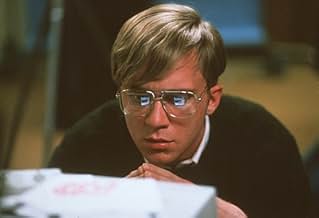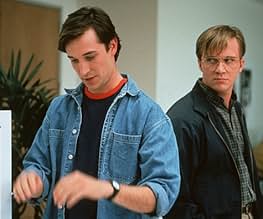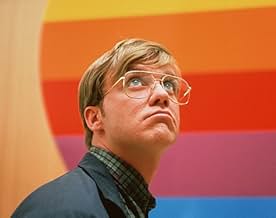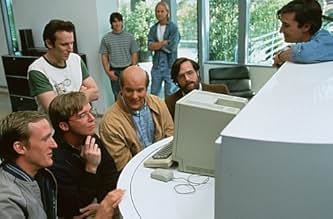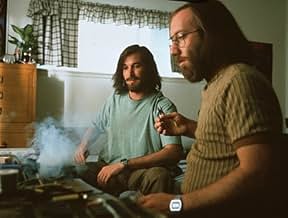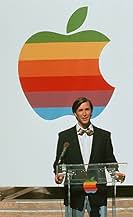History of Apple and Microsoft.History of Apple and Microsoft.History of Apple and Microsoft.
- Director
- Writers
- Stars
- Nominated for 5 Primetime Emmys
- 2 wins & 9 nominations total
- Director
- Writers
- All cast & crew
- Production, box office & more at IMDbPro
Featured reviews
What you have in Pirates of Silicon Valley is a basic skeletal structure of the formation of Apple Computers and the gigantic Microsoft corporation, but it's not a very detailed account. Sure, it follows the creators from high school age, but the film structure is very blocky and it jumps around a lot.
We get no hint about why the names Apple and Microsoft were chosen (a trivial point, yes, but it would have been a good thing to put in a film about the history of those two companies). Also, late in the film the time gets a little confusing. The year is always noted on the bottom of the screen, but the story jumps sporadically from year to year. When you don't jump ahead in time for a while, you begin to lose track of what year you're in. You think you're looking at the early eighties, but the late 90s model Ford Broncos in the background can be very confusing.
Pirates of Silicon Valley was a fairly informative look at how Apple and Microsoft came to be, and there were some very interesting looks at what the first personal computers looked like, but the film itself is not nearly as informative as it should be. A movie about one of the biggest corporations the world has ever known (and it's president, the wealthiest man on the planet) needs to go into a bit more detail about the subject matter that it is presenting. This film was put together fairly well, but there was just not enough effort and research put into it by the writers and producers.
We get no hint about why the names Apple and Microsoft were chosen (a trivial point, yes, but it would have been a good thing to put in a film about the history of those two companies). Also, late in the film the time gets a little confusing. The year is always noted on the bottom of the screen, but the story jumps sporadically from year to year. When you don't jump ahead in time for a while, you begin to lose track of what year you're in. You think you're looking at the early eighties, but the late 90s model Ford Broncos in the background can be very confusing.
Pirates of Silicon Valley was a fairly informative look at how Apple and Microsoft came to be, and there were some very interesting looks at what the first personal computers looked like, but the film itself is not nearly as informative as it should be. A movie about one of the biggest corporations the world has ever known (and it's president, the wealthiest man on the planet) needs to go into a bit more detail about the subject matter that it is presenting. This film was put together fairly well, but there was just not enough effort and research put into it by the writers and producers.
This is an engaging historical-fiction look at the development of the famous computer companies Apple and Microsoft. The performances are terrific, but the film suffers from trying to handle several main characters and cover a lot of historical events. It is also unfortunate that there are three main characters all named "Steve."
The story is told from the perspective of Steve Wozniak (Joey Slotnik), who is portrayed as a gentle head and caring foil to Noah Wyle's brilliant but cruel portrayal of Steve Jobs, Wozniak's Apple co-founder. Anthony Michael Hall obviously has a wonderful time playing the weaselly Bill Gates.
The title is a pun referencing both the buccaneering style Jobs celebrated at Apple, and the idea of unethically 'pirating' the computer developments of other engineers. The film's main point is that both Apple and Microsoft gained their key functionality, the image-based screen display of a computer system (GUI) and the 'mouse' pointing device, by 'pirating' the ideas. Apple swipes them from Xerox, then Microsoft swipes them from Apple.
This is a personality study and not a technical review, and while that may make it more accessible the film doesn't make it entirely clear why Jobs provides so much access to Gates and his crew (presumably Gates is supposedly modifying his computer language, BASIC, to work on the Apple?)
I'd have to know a lot more about Wozniak, Jobs, and Gates before judging them from this film, which is especially hard on Jobs. Wyle portrays him as a selfish and arrogant adolescent, exploiting and manipulating friends and subordinates. Altogether the film is worth watching, but bittersweet and possibly slanted.
The story is told from the perspective of Steve Wozniak (Joey Slotnik), who is portrayed as a gentle head and caring foil to Noah Wyle's brilliant but cruel portrayal of Steve Jobs, Wozniak's Apple co-founder. Anthony Michael Hall obviously has a wonderful time playing the weaselly Bill Gates.
The title is a pun referencing both the buccaneering style Jobs celebrated at Apple, and the idea of unethically 'pirating' the computer developments of other engineers. The film's main point is that both Apple and Microsoft gained their key functionality, the image-based screen display of a computer system (GUI) and the 'mouse' pointing device, by 'pirating' the ideas. Apple swipes them from Xerox, then Microsoft swipes them from Apple.
This is a personality study and not a technical review, and while that may make it more accessible the film doesn't make it entirely clear why Jobs provides so much access to Gates and his crew (presumably Gates is supposedly modifying his computer language, BASIC, to work on the Apple?)
I'd have to know a lot more about Wozniak, Jobs, and Gates before judging them from this film, which is especially hard on Jobs. Wyle portrays him as a selfish and arrogant adolescent, exploiting and manipulating friends and subordinates. Altogether the film is worth watching, but bittersweet and possibly slanted.
An excellent movie ....
Those who refuse to learn from the mistakes of the past are doomed to repeat them!! BIG corporate America incapable of a little (personal computer) vision. Put the two together and you've got ENTERPRISE.
HOW TO WIN AT BIG BUSINESS: Step #1 - Show them (the customer) that YOU have something that they really can't live without, Step #2 - CAPITALIZE on their weakness(es).
The movie is about how Steve [Steven Paul Jobs (2/24/55), Apple Computers; Cofounder, Steven Wozniak] and Bill [William Henry Gates III (10/28/55), Microsoft; Cofounder, Paul Allen] built their respective companies into their own view of what they wanted computers to be and then, in the end, who eventually gobbled-up whom.
The high point in the movie, for me at least, was when Bill Gates found himself in jail and the door to his cell was closing in on him (for a traffic violation).
In the last few scenes we hear Steve talking to Bill. "We're better than you are ... we have better stuff," Steven Jobs. "You don't get it, Steve, THAT doesn't matter!" Bill Gates.
The movie may have ended, but the STORY goes on ....
Rating: 10 out 10 stars
Those who refuse to learn from the mistakes of the past are doomed to repeat them!! BIG corporate America incapable of a little (personal computer) vision. Put the two together and you've got ENTERPRISE.
HOW TO WIN AT BIG BUSINESS: Step #1 - Show them (the customer) that YOU have something that they really can't live without, Step #2 - CAPITALIZE on their weakness(es).
The movie is about how Steve [Steven Paul Jobs (2/24/55), Apple Computers; Cofounder, Steven Wozniak] and Bill [William Henry Gates III (10/28/55), Microsoft; Cofounder, Paul Allen] built their respective companies into their own view of what they wanted computers to be and then, in the end, who eventually gobbled-up whom.
The high point in the movie, for me at least, was when Bill Gates found himself in jail and the door to his cell was closing in on him (for a traffic violation).
In the last few scenes we hear Steve talking to Bill. "We're better than you are ... we have better stuff," Steven Jobs. "You don't get it, Steve, THAT doesn't matter!" Bill Gates.
The movie may have ended, but the STORY goes on ....
Rating: 10 out 10 stars
This is definitely a must-see for any IT person or anyone just wanting to see a great movie. The cast is incredible, the acting is incredible, the story is also incredible. I wish that this had been released on dvd, I would be first in line to purchase it. It is basically the story of how Apple Computers grew, and how Microsoft grew, they met up, and Microsoft took over. Im not sure how historically accurate this is, however I do know the basic jist is correct. The real life "Woz" validated on his website the correctness of this movie. He also said that the way people are portrayed is how they were. Noah Wyle is excellent as a heartless and cruel Steve Jobs. Anthony Michael Hall is equally great as a geeky Bill Gates. I hope TNT replays it at some point in time, in case it does, RECORD it. I believe its also available for rent. SEE THIS MOVIE.
A flawed but intriguing character study of two of the most extraordinary individuals of our modern technological era.
The movie is historically inaccurate. Nevertheless, it manages to capture the essence of how much of modern computing came to be: the cluelessness of Xerox about what its own computer scientists were doing; Steve Jobs' artistic vision at Apple; and Bill Gates' ruthless business practices at Microsoft. And you will be fascinated by how these men got where they are today.
The movie isn't very kind to either Jobs or Gates, emphasizing their negative qualities. Steve Jobs is presented as a visionary, but also as a slavedriver and someone who refuses to accept that he's the illegitimate father of a young girl.
Gates is portrayed in an even less flattering way--as some kind of outright sociopath who is driven to destroy all those who try to do business with him. Still, as long as you recognize that the portrayals are negatively slanted, you will be rewarded by witnessing the interplay among the famous triangle: Adele Goldberg (not explicitly named in the movie), the leader of Xerox's research team; Steve Jobs, who ripped her off and incorporated those technologies in the new Macintosh; and Bill Gates, who ripped off Jobs and incorporated those technologies in the newer Windows product.
The movie does suffer from several historical inaccuracies. I believe that at least some of those inaccuracies were deliberate--attempts to oversimplify the historical record in order to shorten the length of the movie. For example, the movie makes it appear that Apple's first attempt at a computer with a modern graphical user interface--the Lisa--was a tremendous success, when in fact it was a commercial failure. But portraying it as a success made it simpler to explain why Bill Gates got interested in dealing with Apple at that time.
While the movie is long, it would have been even better as a two-day or three-day miniseries. That would have enabled some of the historical record to be explored at greater depth, eliminating the need for this deliberate vast oversimplification.
The movie is historically inaccurate. Nevertheless, it manages to capture the essence of how much of modern computing came to be: the cluelessness of Xerox about what its own computer scientists were doing; Steve Jobs' artistic vision at Apple; and Bill Gates' ruthless business practices at Microsoft. And you will be fascinated by how these men got where they are today.
The movie isn't very kind to either Jobs or Gates, emphasizing their negative qualities. Steve Jobs is presented as a visionary, but also as a slavedriver and someone who refuses to accept that he's the illegitimate father of a young girl.
Gates is portrayed in an even less flattering way--as some kind of outright sociopath who is driven to destroy all those who try to do business with him. Still, as long as you recognize that the portrayals are negatively slanted, you will be rewarded by witnessing the interplay among the famous triangle: Adele Goldberg (not explicitly named in the movie), the leader of Xerox's research team; Steve Jobs, who ripped her off and incorporated those technologies in the new Macintosh; and Bill Gates, who ripped off Jobs and incorporated those technologies in the newer Windows product.
The movie does suffer from several historical inaccuracies. I believe that at least some of those inaccuracies were deliberate--attempts to oversimplify the historical record in order to shorten the length of the movie. For example, the movie makes it appear that Apple's first attempt at a computer with a modern graphical user interface--the Lisa--was a tremendous success, when in fact it was a commercial failure. But portraying it as a success made it simpler to explain why Bill Gates got interested in dealing with Apple at that time.
While the movie is long, it would have been even better as a two-day or three-day miniseries. That would have enabled some of the historical record to be explored at greater depth, eliminating the need for this deliberate vast oversimplification.
Did you know
- TriviaAt the 1999 Macworld conference, shortly after the premiere of this TV movie, the introductory comments were made not by Steve Jobs, but by Noah Wyle, reprising his role in this movie. The real Jobs emerged shortly after and traded jokes with Wyle.
- GoofsWhen Bill Gates and Paul Allen are working out of the motel they are staying at in Albuquerque, there is a sign in the window that reads "Microsoft". At that time (1975), Microsoft was spelled as "Micro-Soft".
- Quotes
Bill Gates: You know how you survive? You make people need you. You survive because you make them need what you have. And then they have no where else to go.
- Crazy creditsJanja Vujovich is credited as "Post Sound Goddess".
- Alternate versionsAspect ratio was re-cut to 1.78:1 for some TV broadcast and DVD releases.
- ConnectionsFeatured in The 51st Annual Primetime Emmy Awards (1999)
Details
- Release date
- Country of origin
- Official site
- Language
- Also known as
- 微軟英雄
- Filming locations
- UCLA, Westwood, Los Angeles, California, USA(UC Berkeley, Harvard)
- Production companies
- See more company credits at IMDbPro
Contribute to this page
Suggest an edit or add missing content


